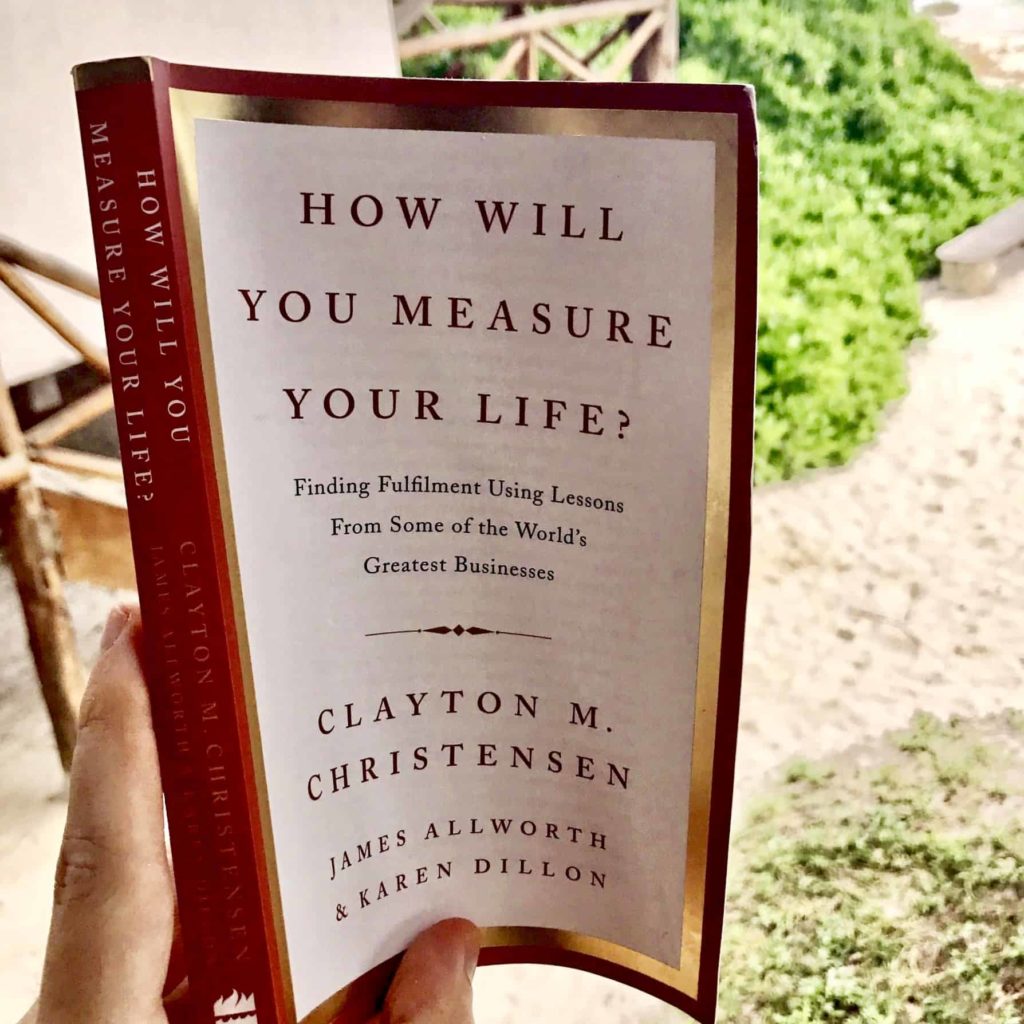Last updated: September 29, 2023
“How Will You Measure Your Life?” by Clayton M. Christensen is one of my new favorite books.
I read it, oddly, while attending Bikini Bootcamp in Tulum, Mexico.
Here are my favorite highlights from the book:

Starting Questions: How will you measure your life?
- How can I be sure that I will be successful and happy in my career?
- How can I be sure that my relationships with my spouse, my children, and my extended family and close friends become an enduring source of happiness?
- How can I be sure that I will live a life of integrity – and stay out of jail?

Importance of Planning
There are many times in life where we simply cannot afford to learn on the job. You don’t want to go through multiple marriages to learn how to be a good spouse.
Power of Theory
Without theory, we’re at sea without a sextant. If we can’t see beyond what’s close by, we’re relying on chance – on the currents of life – to guide us. Good theory helps people steer to good decisions – not just in business, but in life, too.
Reactive vs Proactive
The trap many people fall into is to allocate their time to whoever screams loudest, and their talent to whatever offers them the fastest reward.
Creating Your Strategy
These factors combine to create your strategy:
- Priorities
- Balancing plans with opportunities
- Allocating your resources
What is Strategy?
Strategy is not a discrete analytical event – something decided in a meeting of top managers based on the best numbers and analysis available at the time.
Rather, it is a continuous, diverse, and unruly process. Managing it is very hard – the deliberate strategy and the new emerging opportunities fight for resources.
Evolving Strategy
What we can learn from how companies develop strategy is that although it is hard to get it right at first, success doesn’t rely on this. Instead, it hinges on continuing to experiment until you do find an approach that works. Only a lucky few companies start off with the strategy that ultimately leads to success.
93 percent of all companies that ultimately became successful had to abandon their original strategy – because the original plan proved not to be viable.
Resource Allocation and Strategy
“To understand a company’s strategy, look at what they actually do rather than what they say they will do.” Andy Grove
Individuals prioritized things that gave them immediate returns – such as a promotion, a raise, or a bonus – rather than the things that require long-term work.
Strategy: Summary
Strategy – whether in companies or in life – is created through hundreds of everyday decisions about how you spend your time, energy, and money. With every moment of your time, every decision about how you spend your energy and your money, you are making a statement about what really matters to you.
Factors of Motivation
A new theory says there are two different types of factors for motivation:
- Hygiene factors
- Motivation factors
Hygiene factors are things like status, compensation, job security, work conditions, company policies, and supervisory practices.
Fun fact: The opposite of job dissatisfaction is not job satisfaction, but rather an absence of job dissatisfaction.
Motivation factors include channeling work, recognition, responsibility, and personal growth. Feelings that you are making a meaningful contribution to work arise from intrinsic conditions of the work itself.
New ideas: What has to prove true?
Ask the project teams to compile a list of all the assumptions that have been made in those initial projection. Then ask them: “Which of these assumptions need to prove true in order for us to realistically expect that these numbers will materialize?”
Time Management
- I know that spending my time this way is not consistent with my priorities.
- I’ve had to force myself to stay aligned with what matters most to me by setting hard stops, barriers, and boundaries in my life.
Prioritization
Employees at every level will make prioritization decisions – what they will focus on today, and what they’ll put at the bottom of their list.
The larger and more complex a company becomes, the more important it is for senior managers to ensure employees make, by themselves, prioritization decisions that are consistent with the strategic direction and the business model of the company.
It means that successful senior executives need to spend a lot of time articulating clear, consistent priorities that are broadly understood throughout the organization. Over time, a company’s priorities must be in sync with how the company makes money because employees must prioritize those things that support the company’s strategy.
Never Outsource the Future
Figure out what capabilities you will need to succeed in the future. These must stay in-house – otherwise, you are handing over the future of your business.
Ship of Theseus / Theseus’ Paradox
Instead of quoting it, I’ll include a helpful video explaining:
Related: If your children gain their priorities and values from other people … whose children are they?
Family
The relationships you have with family and close friends are going to be the most important sources of happiness in your life.
The path to happiness is about finding someone who you want to make happy, someone whose happiness is worth devoting yourself to.
Sacrifice deepens our commitment.
Children and Parenting
When parents engaged in face-to-face conversation with the child — speaking in fully adult, sophisticated language as if the child could be part of a chatty, grown-up conversation — the impact on cognitive development was enormous.
- The two fundamental jobs that children need to do are to feel successful and to have friends – every day.
- Children will learn when they are ready to learn, not when we’re ready to teach them.
Self-Esteem
Self-esteem is the sense that “I’m not afraid to confront this problem and I think I can solve it.”
Self-esteem comes from achieving something important when it’s hard to do.
Family Org as Business
What are your capabilities? What about your family’s? It may seem funny to think of ourselves as a composite of resources, processes, and priorities, just like a business. But it’s an insightful way to assess what we are able to accomplish in our own lives – and what might be out of our reach.
Growth vs Profitability
There are two goals investors have when they put money into a company: growth and profitability.
- When the winning strategy is not yet clear in the initial stages of a new business, good money from investors needs to be patient for growth but impatient for profit.
- Once a viable strategy has been found, investors need to change what they seek – they should become impatient for growth and patient for profit.
If a company has ignored investing in new businesses until it needs those new sources of revenue and profits, it’s already too late. It’s like planting saplings when you decide you need more shade.
Henry Ford Quote on Technology
If you need a machine and don’t buy it, then you will ultimately find that you have paid for it and don’t have it.
Staying Out of Jail
Because failure is often at the end of a path of marginal thinking, we end up paying for the full cost of our decisions, not the marginal costs, whether we like it or not.
Life is just one unending stream of extenuating circumstances.
It’s easier to hold to your principles 100 percent of the time than it is to hold to them 98 percent of the time.
Nick’s Conclusion
I consider the book “How will you measure your life?” one of my all-time favorites. I hope to come back to these notes and remind myself of the key learnings.
“Management is among the most noble of professions if it’s practiced well.”
How Will You Measure Your Life? Clay Christensen at TEDxBoston
If you liked this book (and I loved it), here are some others you might enjoy:
- Measure What Matters: Book Club Discussion
- 10 Years of Warren Buffett Book Recommendations
- Great Book: Shoe Dog by Phil Knight
- Good CEO Book: The Outsiders
My friend Nina Simon suggested that we read this during our long weekend retreat at Bikini Bootcamp (related video). If you’re curious about how to read more books, consider this: How To Read More Books: Read Them Like Magazines.
More Information
Comments
- Mark Nungesser: Nick great summary- Thank you. Earliy in my career I am guilty of prioritizing things that gave me immmediate returns – such as a promotion, a raise, or a bonus – rather than the things that require long-term work. Now I look back with regret as I know I did not balance my work life with my family/personal life.
